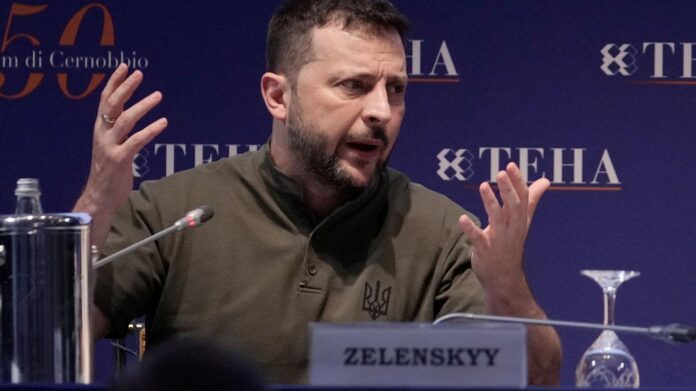
At the meeting of international allies at the US air base in Ramstein, Rhineland-Palatinate, Ukraine received promises of further military support. However, the officially announced promises fell short of Kiev’s expectations, and the hoped-for permission from the allies to use long-range weapons against military targets on Russian territory was not granted. Ukrainian President Volodymyr Zelenskyj traveled to Ramstein for the talks and flew on to Italy in the evening.
During an appearance at the Ambrosetti Forum on Lake Como, the Ukrainian once again rejected a freezing of the war along the lines of the Korean War. Negotiations with Russia would also only take place from a position of strength. Kremlin chief Vladimir Putin, whom Zelenskyj described as having a “sick mind”, simply wanted to destroy Ukraine and not negotiate. Therefore, he must be forced to make peace, Zelenskyj stressed.
The Ukrainian president reiterated that his country’s armed forces only want to attack military targets on Russian territory with long-range weapons. “We only want to use these long-range weapons against military targets 100 to 300 kilometers away, that’s all,” he said. “We never, ever attack their civilian infrastructure.”
US Secretary of Defense Lloyd Austin had previously shown caution in response to Ukraine’s demands to be allowed to use longer-range weapons against targets in Russia. “I don’t think any one particular capability will be decisive,” Austin said at the end of the Ukraine Contact Group meeting in Ramstein. The current battlefield shows that Russia has relocated certain aircraft that can use glide bombs – so that they are stationed outside the range of US ATACMS missiles.
When a journalist asked whether Zelensky had said there were strategic targets in Russia that could be hit with long-range weapons, Austin was evasive. There are many targets in Russia and Ukraine has many ways to attack them – for example with drones. “I think that for the foreseeable future we will ensure that we continue to focus on helping Ukraine to effectively defend its territory,” Austin continued.
New military aid for Ukraine
Around the Ramstein meeting, Ukraine received promises of new military support. According to Austin, the USA wants to provide additional military aid of around 250 million US dollars (around 225 million euros) to ward off the Russian war of aggression. In recent months, the USA has already provided several tranches of military aid after the US Congress released new funds of around 61 billion US dollars (56.2 billion euros) for Kiev at the end of April. The USA is Ukraine’s most important ally and largest arms supplier in its defensive fight against Russia.
The second most important arms supplier, Germany, also promised new weapons and is supporting Ukraine with twelve more Panzerhaubitz 2000s worth 150 million euros. Federal Defense Minister Boris Pistorius (SPD) promised Zelensky that the first six of the modern artillery guns would be delivered this year and the other six next year.
Great Britain promised Kiev additional anti-aircraft weapons, and the Netherlands announced a weapons and equipment package for Ukrainian F-16 fighter jets worth 80 million euros. Canada also wanted to provide additional weapons and ammunition. Among other things, rocket engines and associated warheads for air-to-ground missiles deployed by helicopters will be delivered. To this end, Canada began training Ukrainian pilots for F-16 fighter jets this week. Spain’s government announced that it would provide the Ukrainians with a complete battery of Hawk missiles for air defense.
EU increases humanitarian aid
The EU is increasing its humanitarian aid following the recent Russian attacks on Ukraine’s energy infrastructure. An additional 35 million euros will be made available before the coming winter, the European Commission announced. A further five million euros are earmarked to support Ukrainian refugees and their reception in neighboring Moldova.
In Ukraine, the EU wants to use the money to help repair damaged buildings and ensure electricity and heat supplies. In Moldova, the new funds will be used to improve preparations for additional refugees.
Including the funds announced this Friday, the Commission says it has already allocated EUR 966 million to support civilians affected by the war in Ukraine. According to Commissioner Janez Lenarcic, this year’s total now increases to EUR 110 million for Ukraine and EUR 13 million for Moldova.
© dpa-infocom, dpa:240907-930-225626/1
This is a message directly from the dpa news channel.
